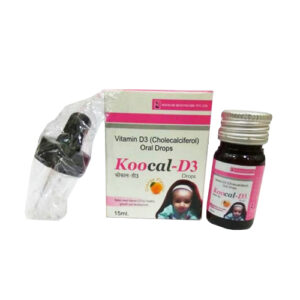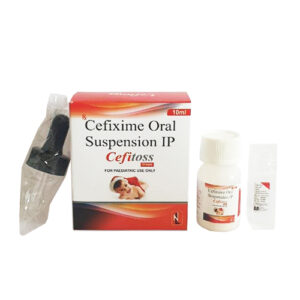- Home
- PAEDIATRIC DROP
- Vitamin d3 Oral Solution Drops


Vitamin d3 Oral Solution Drops
KOOCAL D3
Enquiry about Vitamin d3 Oral Solution Drops

Vitamin D3 Oral Solution, 60000 IU/5 ml– Vitamin D3 oral solution drops are a liquid form of vitamin D3 that can be taken by mouth. Vitamin D3 is a nutrient that is essential for strong bones and teeth, and it also plays a role in the immune system. Vitamin D3 is produced naturally by the body when skin is exposed to sunlight, but some people may not get enough vitamin D3 from sunlight alone.
Vitamin D3 oral solution drops are typically prescribed for people who have a vitamin D deficiency, such as people who do not get enough sunlight exposure, people with certain medical conditions, and older adults. Vitamin D3 oral solution drops are also sometimes prescribed for people who have certain bone diseases, such as osteoporosis. Vitamin D3 oral solution drops are easy to take and can be absorbed quickly by the body. They are also safe for most people to take, even infants and children.
Uses of Vitamin D3 Oral Solution
Vitamin D3 oral solution is used to treat Vitamin D deficiency. It is also used to prevent Vitamin D deficiency in people who are at risk, such as:
- Older adults: Older adults have a harder time absorbing Vitamin D from sunlight, so they are more likely to be deficient.
- People with dark skin: People with dark skin have less melanin, which is a pigment that blocks the absorption of Vitamin D from sunlight. This makes them more likely to be deficient.
- Breastfed infants: Breast milk is low in vitamin D, so breastfed infants need to receive a supplement from birth.
- People with certain medical conditions: People with certain medical conditions, such as Crohn’s disease, cystic fibrosis, and celiac disease, have difficulty absorbing Vitamin D from food.
- People who do not get enough sunlight exposure: People who live in northern latitudes, who spend a lot of time indoors, or who wear sunscreen may not get enough Vitamin D exposure from sunlight.
Precautions for the use of Vitamin D3 Oral Solution
- Do not take more vitamin D3 than your doctor prescribes. Taking too much Vitamin D3 can cause serious side effects, such as hypercalcemia, which is a high level of calcium in the blood.
- Talk to your doctor if you have any medical conditions, such as liver disease, kidney disease, heart disease, hyperparathyroidism, or cancer. Vitamin D3 oral solution may interact with certain medications and medical conditions.
- Tell your doctor about all the medications you are taking, including over-the-counter medications and herbal supplements. Vitamin D3 oral solution can interact with certain medications.
- Do not take Vitamin D3 oral solution if you are pregnant or breastfeeding. Talk to your doctor about the safety of taking Vitamin D3 oral solution during pregnancy and breastfeeding.
- Keep Vitamin D3 oral solution out of reach of children. Vitamin D3 oral solution can be harmful if taken in large doses.
Directions for using Vitamin D3 Oral Solution
- Before use, make sure to shake the bottle well. This helps ensure that the solution is properly mixed.
- Use the provided dropper or measuring device to carefully measure the prescribed dose of the solution. Ensure accuracy in measurement.
- Place the measured dose in the mouth. You can give it directly or mix it with a small amount of liquid or food. If mixed, make sure the entire mixture is consumed.
- Follow the dosage instructions provided by your healthcare provider. Do not take more or less than prescribed.
Possible Side Effects of Vitamin D3 Oral Solution
Vitamin D3 oral solution is generally considered safe when taken as directed. However, like any medication, it may have some potential side effects. These can include:
- Allergic Reactions
- Excessive Calcium Levels
- Kidney Problems
- Digestive Issues
- Bone Pain
- Irregular Heartbeat



